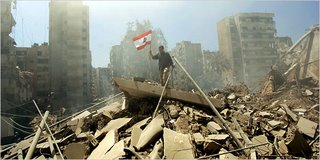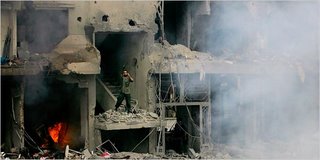Monday, August 14, 2006
The 'peace' dividend. posted by Richard Seymour
 Israel is about to swing dramatically to the right, if current indications are anything to go by. Israelis interviewed on Channel Four news all (aside from twits like Michael Oren, the historical fabricator cum Israeli military spokesperson) expressed dismay. Not at the butchery inflicted on Lebanon. Not at the obscene massacres carried out by the IDF. Not by the despicable excuses given by their government for leading them into an unnecessary and brutal war. But at the fact that they lost. Oh, they all know the Lebanese resistance won this one. A couple of days ago, a poll found that only 20% of Israelis believed they were winning. I'd be surprised if that many believe they've won. Returning soldiers look shell-shocked. They can't believe it. Those returning to northern Israel (non-Arabs, that is, those who had been able to flee and those who most supported the war) were deeply bitter. Israeli opposition politicians were seen angrily storming out of parliament. Binyamin Netanyahu is furious with the deal. Israelis have tended to be more angry with Olmert and the failure to stop rockets hitting the north of the country than anything else.
Israel is about to swing dramatically to the right, if current indications are anything to go by. Israelis interviewed on Channel Four news all (aside from twits like Michael Oren, the historical fabricator cum Israeli military spokesperson) expressed dismay. Not at the butchery inflicted on Lebanon. Not at the obscene massacres carried out by the IDF. Not by the despicable excuses given by their government for leading them into an unnecessary and brutal war. But at the fact that they lost. Oh, they all know the Lebanese resistance won this one. A couple of days ago, a poll found that only 20% of Israelis believed they were winning. I'd be surprised if that many believe they've won. Returning soldiers look shell-shocked. They can't believe it. Those returning to northern Israel (non-Arabs, that is, those who had been able to flee and those who most supported the war) were deeply bitter. Israeli opposition politicians were seen angrily storming out of parliament. Binyamin Netanyahu is furious with the deal. Israelis have tended to be more angry with Olmert and the failure to stop rockets hitting the north of the country than anything else. Israel cannot sustain this loss. Its existence relies on, and has always relied on, extreme military superiority: the Iron Wall. The almost uniform support for the war on the Israeli left, initially including Peace Now, was indicative of this. In the short term, the Zionist enterprise was by no manner of means at stake. But since, as Avi Shlaim and others have pointed out, the Zionist enterprise needs to keep the Arabs under thumb for its success; since its existence is a colossal wrong to the Arabs; since it is a brutally racist and oppressive venture that could not have come about and survived without breaking Arab resistance; it cannot sustain a defeat like this. It will not stand. Already, Olmert prepares his excuses for relaunching the war once a new and perhaps better strategy is devised: "When Hizbullah violates the cease-fire, the world will see who the aggressor is and will understand us". Israel has demonstrated that it can be rather promiscuous with the letter of UN resolutions itself, and the punctiliousness of opponents will make no difference to that. Already, Israel claims to have killed six Hezbollah fighters today.
Israel cannot sustain this loss. Its existence relies on, and has always relied on, extreme military superiority: the Iron Wall. The almost uniform support for the war on the Israeli left, initially including Peace Now, was indicative of this. In the short term, the Zionist enterprise was by no manner of means at stake. But since, as Avi Shlaim and others have pointed out, the Zionist enterprise needs to keep the Arabs under thumb for its success; since its existence is a colossal wrong to the Arabs; since it is a brutally racist and oppressive venture that could not have come about and survived without breaking Arab resistance; it cannot sustain a defeat like this. It will not stand. Already, Olmert prepares his excuses for relaunching the war once a new and perhaps better strategy is devised: "When Hizbullah violates the cease-fire, the world will see who the aggressor is and will understand us". Israel has demonstrated that it can be rather promiscuous with the letter of UN resolutions itself, and the punctiliousness of opponents will make no difference to that. Already, Israel claims to have killed six Hezbollah fighters today.But I suspect something even more drastic than that may be afoot. Netanyahu, although he was far less aggressive than either Barak, Sharon or Olmert in office, will probably find his political career resurgent, and on this basis try to launch a wide-ranging war on Israel's enemies. However, it is important not to forget that Israel's loss provides a vital window for its other targets. As Sy Hersh reports:
The surprising strength of Hezbollah’s resistance, and its continuing ability to fire rockets into northern Israel in the face of the constant Israeli bombing, the Middle East expert told me, “is a massive setback for those in the White House who want to use force in Iran. And those who argue that the bombing will create internal dissent and revolt in Iran are also set back.”
In Lebanon, meanwhile, the signs remain that the sectarianism of old has been buried. The losers will be the pro-Hariri gang, Walid Jumblatt who blamed Israel's aggression on Iran, Syria and Hezbollah, the Cedar revolutionaries and every de facto pro-Israeli politician who refused to support the Lebanese resistance. Though the resistance was broader than Hezbollah, the latter undoubtedly hegemonised it and I would be surprised if they did not make huge political gains from this. The Palestinians - who, let us not forget, are still being attacked by Israel - are greatly encouraged by Hezbollah's successes. Hamas has already expressed the hope that every Arab capital will soon have its own Hezbollah. Huge pro-Hezbollah rallies have taken place in Gaza.
Although this victory for the Lebanese resistance may soon be shrouded in the smoke of another war and although Israel is not yet out of southern Lebanon (neither is Hezbollah), at the moment it stands as a huge shot in the arm for dissidents in every Arab country. The Egyptian dictatorship, I hazard a guess, is afraid for its survival. It did not, I note, suppress the anti-Israeli demonstrations as viciously as it has other demonstrations - despite the fact that the slogans were anti-Mubarak. A victory for the opposition there would be even more significant than this defeat for Israel. This is why the US provides the Egyptian dictatorship with so much cash: it cannot have a country that could easily be the leader of the Arab world once more fall to some form of independent nationalism, providing support to the Palestinians and Iraqi resistance fighters. But this is what we must look to and encourage, and it can't be left to the Islamists. The Muslim Brothers are too easily coopted, and the more radical Islamist groups pursue brutal substitutionist strategies which allow them to be butchered rather quickly by the Egyptian state (as when the rather repellent Gama'a al-Islamiyya were 'cleaned out' of a working class quarter of Embada in 1992) and which provide carte blanche for the state to arrest, torture and kill other dissidents. This is not to say that some Islamist groups haven't worked with the left and the Nasserists: they have and should work together where possible. Hezbollah can fight Israel, brilliantly, but we have to look in the long term to a resurgence of working class politics across the Middle East, starting in Egypt.










